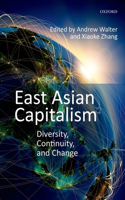
East Asian Capitalism: Diversity, Continuity, and Change
Series:
The increasing economic and political importance of East Asia in the global political economy requires a deeper analysis of the nature of the capitalist systems in this region than has been provided by the existing literature on comparative capitalisms. This volume brings together conceptual and empirical analyses of the evolving patterns of East Asian capitalism against the backdrop of regional a
NaN
VOLUME
English
Paperback

The increasing economic and political importance of East Asia in the global political economy requires a deeper analysis of the nature of the capitalist systems in this region than has been provided by the existing literature on comparative capitalisms. This volume brings together conceptual and empirical analyses of the evolving patterns of East Asian capitalism against the backdrop of regional and global market integration and periodic economic crises since the 1980s. Focusing on China, Japan, South Korea, Indonesia, the Philippines, Malaysia, Taiwan, and Thailand, it provides an interdisciplinary account of variations, continuities, and changes in the institutional structures that govern financial systems, industrial relations, and product markets, and that shape the evolution of national political economies. While the volume encompasses a range of different cases, specific issues, and diverse methodologies, all the chapters address two dominant themes - the continuities and changes in the institutional underpinnings of capitalist development and the main driving forces behind them. The book thus provides an integrated analysis of how changing institutional practices in business, financial, and labour systems interact and affect the evolution of capitalist political economies in the region.About the Author: Andrew Walter, University of Melbourne, Professor of International Relations, Xiaoke Zhang, Professor, University of Manchester Andrew Walter is Professor of International Relations in the School of Social and Political Sciences at the University of Melbourne. Until September 2012 he was Reader in International Political Economy at the London School of Economics and Political Science. From 2001-2012 Andrew was an Academic Director of the TRIUM Global Executive MBA Programme, an alliance between the LSE, NYU Stern School of Business, and the HEC School of Management (Paris), which was ranked #2 in the world in 2011 by the Financial Times. Externally, over 2009-2012 he served as a member of the Council of Chatham House, a leading British think-tank of international affairs and currently sits on the Academic Advisory Panel of The International Centre for Financial Regulation and on the editorial board of the Review of International Studies, the house journal of the British International Studies Association. Xiaoke Zhang is Professor at the Manchester Business School, the University of Manchester. His research interests are in comparative political economy, with a regional focus on East Asia. His recent publications include The Political Economy of Capital Market Reforms in Southeast Asia (Palgrave Macmillan 2011) and International Financial Governance under Stress (Cambridge University Press, 2003, with Geoffrey R.D. Underhill).
Price Comparison [India]
In This Series
Bestseller Manga
Trending NEWS




















